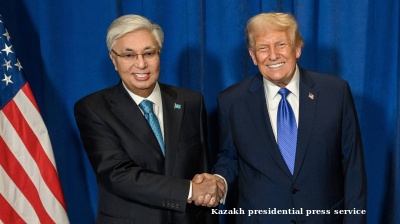Throughout each year, Macro-Advisory tracks and records all books published which are relevant for investors and business managers/planners covering the broad Eurasia region. At the end of each year, Macro-Advisory publishes a summary of the books under relevant categories, such as those covering the Russia-Ukraine conflict, Eurasianism and individual countries. Most are chosen because they offer useful insight into either local and regional economics and politics or cover topics relevant to investors/businesses working in Eurasia.
This has been a bumper year for such books. As expected, there has been a big increase in the number of titles aiming to explain the origins of the conflict in Ukraine or analysing the impact, both current and future. Perhaps of greater surprise has been the surge in the number of books covering Iran, both historical and current. Afghanistan is also now attracting the attention of authors, with several very useful publications appearing in recent months.
Below is a summary of some of the more noteworthy books under the major themes within the region.
The Russia-Ukraine conflict. The number of books covering the conflict in Ukraine continues to expand. Many of the more recent books have similar structures and themes so we have focused on only some of these. Nevertheless, we list 19 books in this category during 2023. Highly recommended is Mikhail Zygar’s War and Punishment: Putin, Zelensky, and the Path to Russia's Invasion of Ukraine. Another, from earlier in the year, is The Russo-Ukrainian War, by eminent historian Serhii Plokhy. Two of those published in late 2022 that remain very relevant, and which give a clear understanding of the origins of the conflict, are Overreach: The Inside Story of Putin and Russia’s War Against Ukraine, by Owen Matthews (December 2022 publication), and Frontline Ukraine: Crisis in the Borderlands, by Richard Sakwa.
General coverage in the Eurasia region. After several very thin years, 2023 saw a plethora of books published covering the Eurasia region and the Eurasianism theme. Some are focused on China’s increasing involvement in the region, e.g., the C+5 Summit in Xian in May. Two of the more useful books are Soft Power in Central Asia: The Politics of Influence and Seduction, by Kirill Nourzhanov, and China and Eurasia: Rethinking Cooperation and Contradictions in the Era of Changing World Order, edited by Mher D Sahakyan and Heinz Gärtner. A very interesting historical book is From Genghis Khan to Tamerlane: The Reawakening of Mongol Asia by Peter Jackson.
The Caucasus. Undoubtedly there will be several books published in 2024 covering the events of the past few months. Meantime, a good primer is The Karabakh Conflict Between Armenia and Azerbaijan: Causes & Consequences, by M. Hakan Yavuz and Michael M. Gunter.
Russia and China's growing relationship. Two of the most useful books covering this relationship are Perfect Imbalance: China and Russia, by Una Alexandra Berzina-Cerenkova, and China and Russia: Four Centuries of Conflict and Concord, by Philip Snow.
More Eurasia country-specific books in 2023. There is also an increase in the number of books looking deeper into Eurasian states. Included in the list of those published through the first half of this year are Belarus in Crisis: From Domestic Unrest to the Russia-Ukraine War, by Paul Hansbury; Kazakhstan: Snow Leopard at the Crossroads, by Christopher Hartwell; A Revolt in the Steppe: Understanding Kazakhstan’s January Events of 2022, by Jean-François Caron; a History of Uzbekistan, Primary History: Ethnic Structure, Independence, Economy, Government Culture, by Brandon Bell.
There are almost no good books looking at the current state of politics or economic development in the other stans but there have been a few chronicling the historical timelines of most Eurasian states and quite a few “travel genre” books, including a rare and very good Turkmenistan travel book Discovering Turkmenistan: A Traveler's Guide by Vikash Dabriwal. Nomadity of Being in Central Asia: Narratives of Kyrgyzstani Women’s Rights Activists, by Syinat Sultanalieva, is one of the few exceptions as is Political Islam and Democracy in Central Asia: The Islamic Revival Party of Tajikistan by Ajam Kalonov. Writers covering Mongolia remain fixated with Genghis Khan, including The Legendary Mongol Khans: The Lives and Legacies of Genghis Khan, Kublai Khan, and Tamerlane by Charles River.
A surge in coverage of Iran and Afghanistan. There has been almost a surge in books published about Iran, especially on 2H23. We mention 11 new books covering such topics as the country’s history, the changes since the 1979 revolution, and the current political tensions in the country. Two of the most useful books are The Sacred Republic: Power and Institutions in Iran and Righteous Politics: Power and Resilience in Iran, both by author Mehran Kamrava. For Afghanistan, Inside Afghanistan: Political Networks, Informal Order, and State Disruption by Timor Sharan provides a very good analysis of the structures of power and influence inside the country today and how these have emerged.
Russian domestic politics. One of the more interesting books is not exclusively about Russia but the country features prominently. It is The Oligarchs’ Grip: Fusing Wealth and Power by David Lingelbach and Valentina Rodríguez Guerra. The best of the Russia politics books is the updated edition of Andrew Monaghan’s The New Politics of Russia. Another to mention is Memory Makers: The Politics of the Past in Putin's Russia, by Jade McGlynn. Otherwise, 2023 has been a light year for Russian political books – undoubtedly that will change when the current conflict ends and more perspective can be added.
Geopolitical theme books. The most interesting book in the geopolitics category is by veteran Soviet-Russia analyst Thomas Graham. He published Getting Russia Right. Robert H. Donaldson and Vidya Nadkarni published The Foreign Policy of Russia: Changing Systems, Enduring Interests. Also worth reading is How the West Lost the Peace: The Great Transformation Since the Cold War, by Philipp Ther, and Russia and the World in the Putin Era: From Theory to Reality in Russian Global Strategy, edited by Roger E. Kanet and Dina Moulioukova. Dagestan - History, Culture, Identity by Robert Chenciner and Magomedkhan Magomedkhanov is a rare overview of one of the most troubled and least understood of Russia’s regions.
Russian economics coverage. The timing of Marek Dabrowski’s book, The Contemporary Russian Economy: A Comprehensive Analysis, is unfortunate given that sanctions and current geopolitical events will substantially alter Russia’s economic profile and outlook.
Some interesting Russian historical updates. Picturing Russian Empire (Premium Edition), by Valerie Kivelson, Sergei Kozlov, and Joan Neuberger is one such update worth reading. It offers a new approach to viewing Russian history with a visual tour of the lands and peoples that constituted the Russian Empire and those that confronted it, defied it, accommodated it, and shaped it at various times. Also worth reading is an updated edition of Robert Wilton’s Russia's Agony. First published in 1918, it is a firsthand account of the revolution.
General interest Russia books. The best, or one of the best books of the year, is The Soul of Russia by Morris Berman. His central argument is that at the heart of this brilliance lies a particular idiosyncratic theme: the peasant-shamanic-folkloric tradition of the Russian people, which these artists, from Pushkin to Bulgakov to Tarkovsky, drew upon for their inspiration. Also worth reading are Masha Karp’s George Orwell and Russia and Spoils of War: A Soldier in a Billionaire's Battles with the Russian Oligarchs Who Placed Vladimir Putin in Power, by Michael Haywood. Another in the “thriller” genre is the Siberia Job, by Josh Haven. A true story focused on the 1990s voucher scheme – those who lived in Moscow in the early-mid 90s will certainly recognize some characters and events.
Developments in Energy and Natural Resources. There were no specific energy sector books published in 1H23. But worth reading is Nature's Evil: A Cultural History of Natural Resources, by Alexander Etkind. It considers the history of the world and the development of humankind through the prism of natural resources – how we acquire them, use them, value them, trade them, and exploit them.
Recommended reading list. Macro-Advisory maintains a Recommended Reading List for the most useful books published over the past couple of decades, also divided into the same categories as mentioned above. The full report, updated twice each year, can be downloaded from the company’s home page at www.macro-advisory.com.
Opinion

COMMENT: Czechia economy powering ahead, Hungary’s economy stalls
Early third-quarter GDP figures from Central Europe point to a growing divergence between the region’s two largest economies outside Poland, with Czechia accelerating its recovery while Hungary continues to struggle.

COMMENT: EU's LNG import ban won’t break Russia, but it will render the sector’s further growth fiendishly hard
The European Union’s nineteenth sanctions package against Russia marks a pivotal escalation in the bloc’s energy strategy, which will impose a comprehensive ban on Russian LNG imports beginning January 1, 2027.

Western Balkan countries become emerging players in Europe’s defence efforts
The Western Balkans could play an increasingly important role in strengthening Europe’s security architecture, says a new report from the Carnegie Europe think-tank.

COMMENT: Sanctions on Rosneft and Lukoil are symbolic and won’t stop its oil exports
The Trump administration’s sanctions on Russian oil giants Rosneft and Lukoil, announced on October 22, may appear decisive at first glance, but they are not going to make a material difference to Russia’s export of oil, says Sergey Vakulenko.




